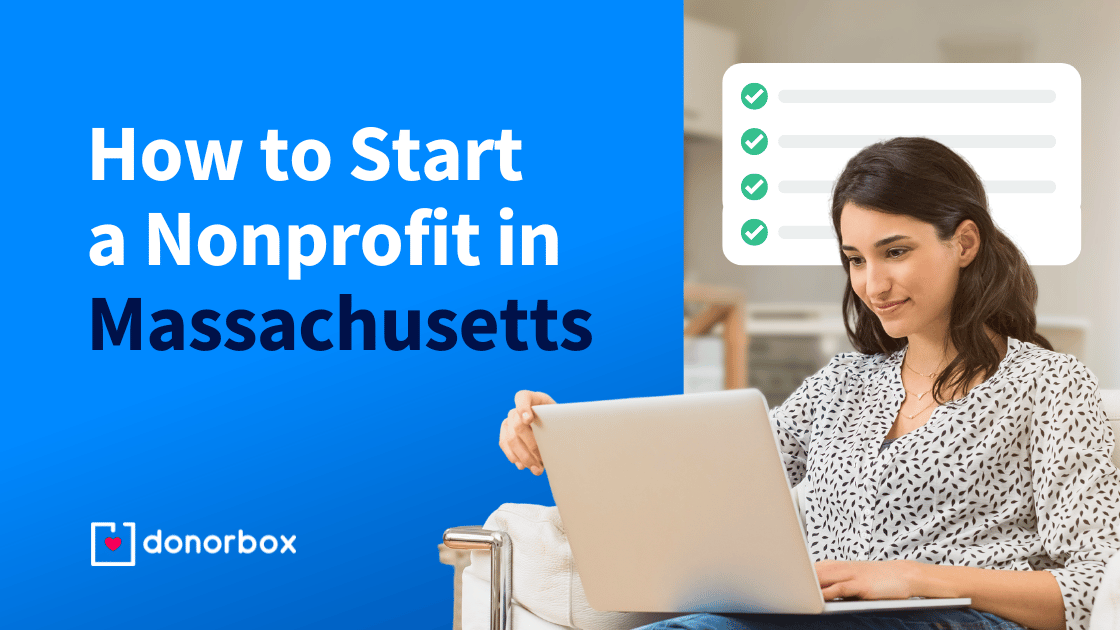There are 42,731 active nonprofits in Massachusetts. If you’re passionate about your cause and have a unique idea to better your community, you can join these organizations. Starting a nonprofit in Massachusetts can feel overwhelming, but this step-by-step guide will help you file the required documents and build a solid foundation for your organization.
Steps to Start a Nonprofit in Massachusetts

Starting a nonprofit takes more than filing a few forms. The long-term success of your organization relies on strong leadership and strategic planning. That’s why over half of the steps below focus on choosing a compelling mission, developing a business plan, and forming a powerful board of directors. As you work through these steps, follow their written order to ensure you limit unnecessary wait times.
Step 1: Name Your Organization
When choosing a name, nonprofits in Maine must indicate that they are corporations. This does not apply to churches. Search for available names at the Secretary of the Commonwealth of Massachusetts Corporations Division. We’ve created a naming checklist to help you find a compelling name in case you struggle to find one that fits.
Step 2: Choose Your Mission
After your nonprofit’s name, the next best way to promote your cause is with your mission statement. The Internal Revenue Service (IRS) requires 501(c)(3) nonprofit organizations to benefit the public with one of the following purposes:
- Charitable
- Religious
- Educational
- Scientific
- Literary
- Testing for Public Safety
- Fostering national or international amateur sports competitions
- Preventing cruelty to children and animals
This purpose gives you an excellent start for your nonprofit mission statement. Since your nonprofit’s purpose statement must be the same on all state and federal applications, choosing a mission statement now will make the process easier. A mission statement also influences an organization’s marketing and culture. As you move to the next step, creating a business plan, keep your mission statement in mind.
Step 3: Create a Business Plan
Once you finalize your nonprofit mission statement, it’s time to create a nonprofit business plan. This plan can help you to:
- Establish your organization’s goals
- Understand your beneficiaries and donors
- Assess the feasibility of your fundraising model
- Solicit funders
- Attract board members and volunteers
Although some may consider business plans unnecessary and old-fashioned, this tool will make filing necessary state and federal paperwork easier and help you find critical startup funds.
Programs and Services
The first section of your nonprofit business plan will lay out the organization’s programs and services. How will you fulfill your mission? What makes you different from other organizations with the same purpose? Answering these questions will have a significant impact on funders. Remember, people’s attention spans are limited, so it’s best to include images and infographics when explaining complicated ideas.
Marketing Plan
Your programs and services are critical, but you must also know your target market. Your marketing plan is where you should provide details on two types of markets: donors and beneficiaries.
You’ll need information on their demographics, interests, and giving ability. Your marketing plan should include communication plans for potential donors, foundations, partners, etc.
Operational Plan
The following section will help you create your organization’s bylaws, which are required when applying for tax exemption with the IRS. Your operational plan should include day-to-day activities, necessary legal requirements, and any insurance you may need. An organizational chart will help you provide details on the roles and responsibilities of your nonprofit board and staff.
Impact Plan
The effect your nonprofit has on your community is its greatest appeal to funders. In the beginning, your organization’s impact is entirely in your mind. It’s vital to spend time on this section of your business plan and elaborate on how your organization can reach its goals.
Financial Plan
Typically, business plan financials will include bank statements and reports. Since you don’t have any, you’ll need to research your competitors. Visit GuideStar and research similar nonprofits’ tax documents for examples of revenues and expenses. This information will give you a solid foundation for your organization’s budgets.
Executive Summary
An Executive Summary is the first thing the funders read, but it should be the last thing you write. This section gives an overview of your business plan and describes your organization’s mission plan, target market, and how you’ll meet the needs of your community.
Appendix
This section provides a space for additional documentation you may need, including:
- IRS determination letter
- Board member resumes
- Marketing pieces
Step 4: Choose an Incorporator and Board of Directors
Nonprofits must have at least one Incorporator to sign your Articles of Incorporation, but you may have more. Massachusetts nonprofits must also have a minimum of one director. The IRS requires three directors to claim a 501(c)(3) tax exemption but recommends more directors to run operations and fundraise for your organization effectively.
Massachusetts nonprofits must also have a President, Treasurer, and Clerk. The President must be a director, and the clerk must be a Massachusetts resident. All board committees must have a minimum of one director.
Step 5: Appoint a Registered Agent
Nonprofits must also have a registered agent. This individual is responsible for receiving legal notices for your organization. Your registered agent must be in the state and open during regular business hours.
Step 6: File Articles of Incorporation
Massachusetts nonprofits must file articles of incorporation online, by fax, or by mail with the Secretary of the Commonwealth of Massachusetts Corporations Division. There is a $41 fee when filing online or by fax and a $35 fee by mail. The turnaround time is two to three business days.
Step 7: Get Your Employer Identification Number
After filing your articles of incorporation, you must file for an employer identification number with the Internal Revenue Service (IRS). You can file Form SS-4 immediately online or by mail. Corporations will receive a certificate of acknowledgment from the secretary of state’s office.
Step 8: Hold Your First Board Meeting
Before filing for tax exemption, you must hold your nonprofit’s first board meeting. This board meeting is an opportunity to elect your officers, assign board members to committees, and start onboarding and training. It’s also time to finalize and adopt the organization’s bylaws and conflict of interest policy and approve opening a bank account.
Bylaws
Your nonprofit bylaws will be a roadmap for your board of directors. Nonprofit bylaws must include the following:
- Name and purpose of your organization
- Officer roles, terms, election details
- Board meeting guidelines, including frequency and quorum
- Board structure, including size and committees
- Membership program details
- Compensation and indemnification of board members
Conflict of Interest Policy
The IRS does not allow any board or staff member to benefit financially from an exempt nonprofit’s earnings. Your organization’s conflict of interest policy will provide rules to follow when individuals in leadership have conflicting priorities.
Step 9: Apply for 501(c) Status

Nonprofits that benefit the public can apply with the IRS as 501(c)(3) organizations and file either Form 1023-EZ or Form 1023. Organizations that earn under $50,000 for the first three years can file Form 1023-EZ for $275. There is an eligibility worksheet to determine if your organization qualifies. All other 501(c)(3) nonprofits must file Form 1023 and pay $600. It can take up to six months to receive your determination letter from the IRS.
Nonprofits that primarily benefit their members may also qualify for some benefits from the IRS. These organizations must use Form 1024 and pay $600 to become 501(c)(4) organizations with the IRS.
Step 10: File for State Tax Exemption
501(c)(3) nonprofits with the IRS are exempt from sales tax in Massachusetts. These organizations are exempt from paying taxes on certain building materials for their locations’ construction, remodeling, or repair.
Nonprofits must complete a Certificate of Exemption (Form ST-2) and completed Form ST-5 and a sales tax-exempt purchaser certificate.
Step 11: Register to Solicit Donations
Before soliciting donations, nonprofits in Massachusetts must register with the office of the Attorney General. After registering, nonprofits must pay an initial filing fee of $100 + either a $50 Schedule A-2 fee for organizations registering before their initial fiscal year’s end or based on revenue received during the preceding fiscal year and are broken down below:
- $70 for gross support and revenue of more than $100,000 but no more than $250,000
- $125 for gross support and revenue of more than $250,000 but no more than $500,000
- $250 for gross support and revenue of more than $500,000 but no more than $1,000,000
- $500 for gross support and revenue of more than $1,000,000 but no more than $10,000,000
- $1,000 for gross support and revenue of more than $10,000,000 but no more than $100,000,000
- $2,000 for gross support and revenue of more than $100,000,000
After registering and paying the required fee, you will receive an AGO number within four to six months. Religious organizations and nonprofits that raise less than $5,000 a year are exempt.
Step 12: Business Licenses and Permits
Massachusetts nonprofits must obtain a permit to host raffles or other gaming events. Massachusetts law requires that active nonprofits only promote the raffle to qualified members of your organization. All proceeds must be used for educational, charitable, religious, fraternal, or civic purposes or for veterans’ benefits. For-profit companies and individuals cannot hold raffles for nonprofits in Massachusetts. Nonprofits must obtain a raffle from the city or town clerk where the raffle is held.
Step 13: File an Annual Report
Massachusetts nonprofits must file an annual report with the Corporations Division within two and a half months after their fiscal year. Nonprofits can file online or by mail. Nonprofits can also use annual reports to build trust with donors and solicit gifts from foundations. You can share your organization’s annual report on your website, social media platforms, and third-party websites like GuideStar.
Conclusion
After reading through this step-by-step guide, we hope you feel prepared to turn your passion into reality. Starting a nonprofit in Massachusetts may sometimes feel overwhelming, but with a well-thought-out process, you can join the tens of thousands of successful organizations in your state and make a difference in your community.
Remember, your nonprofit’s impact extends far beyond its formation.
Donorbox offers many tips and resources to help you build a strong board, attract and manage volunteers, and raise funds.
Visit our website to learn more!
Explore our Donorbox Nonprofit Blog to get tips, fundraising ideas, donor management resources, and more. Subscribe to our newsletter to receive a curated list of our best resources delivered to your inbox every month!






